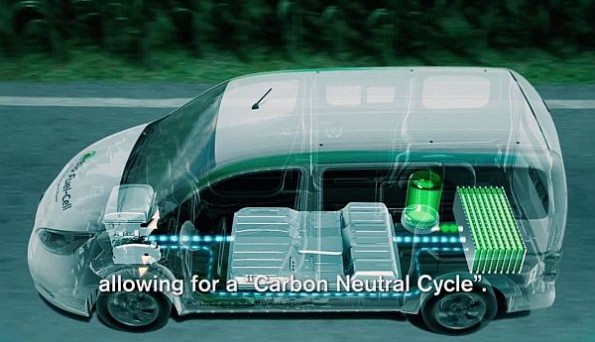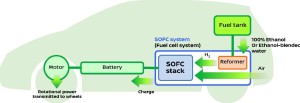Meanwhile in Brazil: Nissan debuts 600 km range solid-oxide fuel-cell car
August 15, 2016
on
on

An e-Bio fuel-cell prototype vehicle is claimed by Nissan to run on 100-percent ethanol or ethanol-blended water to charge a 24-kWh battery, achieving a cruising range of more than 600 km.
The zero-emission vehicle is powered by a solid oxide fuel-cell (SOFC) that first reforms the ethanol into hydrogen and CO2, of which the hydrogen is used to generate electrical power. The small amount of CO2 generated is offset by the process of growing the sugar cane, which is familiar in Brazil where bio-ethanol is common as a main motor fuel.

For sure Nissan already sells the LEAF, a 100% electric car, but with the new fuel cell, the company claims it will enable faster recharge (at the pump in countries like Brazil where the infrastructure already exists) and longer driving range.
Bio-ethanol fuels are mainly sourced from sugar cane and corn. These fuels are widely available in countries in North and South America, as well as Asia, with solid infrastructure in those markets. Due to the easy availability of ethanol and low combustibility of ethanol-blended water, the system is not heavily dependent or restricted by the existing charging infrastructure, making it easy to introduce to the market, according to Nissan.
The zero-emission vehicle is powered by a solid oxide fuel-cell (SOFC) that first reforms the ethanol into hydrogen and CO2, of which the hydrogen is used to generate electrical power. The small amount of CO2 generated is offset by the process of growing the sugar cane, which is familiar in Brazil where bio-ethanol is common as a main motor fuel.

For sure Nissan already sells the LEAF, a 100% electric car, but with the new fuel cell, the company claims it will enable faster recharge (at the pump in countries like Brazil where the infrastructure already exists) and longer driving range.
Bio-ethanol fuels are mainly sourced from sugar cane and corn. These fuels are widely available in countries in North and South America, as well as Asia, with solid infrastructure in those markets. Due to the easy availability of ethanol and low combustibility of ethanol-blended water, the system is not heavily dependent or restricted by the existing charging infrastructure, making it easy to introduce to the market, according to Nissan.
Read full article
Hide full article


Discussion (0 comments)